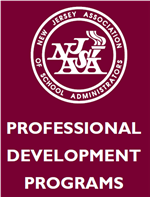- NJASA
- 2014
-
Combining New Jersey School Districts Must Be a Local Decision
Posted by Dr. Richard G. Bozza on 11/14/2014 The
state of New Jersey is trying to determine whether it makes sense to reorganize
our public school districts.
The
state of New Jersey is trying to determine whether it makes sense to reorganize
our public school districts.Said Assemblywoman Donna Simon (R-Flemington), “We’re looking at possibly decreasing redundancies, increasing efficiencies and potentially realizing cost savings by combining resources.” She referenced the recent successful merger of four districts in Hunterdon County as the model.
On the surface, reorganization does seem to deliver in cost savings. But in further investigation, you might be surprised at the barriers that eradicate any potential benefits. Recently, NJASA Director of Governmental Relations Melanie Schulz testified before the Joint Committee on the Public Schools Regarding Regionalization to share the perspective of the state’s Chief Education Officers.
Fortunately, there is no shortage of information on regionalization, or consolidation, of school districts. We’ve been studying the issue for decades—both governmental agencies and private sector organizations. Some Chief Education Officers also have completed feasibility studies in their districts to determine the benefits and costs of regionalization. We have found regionalization to be both complex and debatable.
While there can be benefits derived from consolidating districts, such as articulation across curriculum and increasing the number of course offerings, these may be overshadowed by increased transportation costs, increased tax levies across the affected municipalities, and increased costs related to negotiated labor agreements. In addition, if a school district brings significant debt service to the alliance there may be no savings and there may be new debt where none existed. Importantly, there may not be a cost savings in merging districts.
Between September 2008 and June 2009, the New Jersey Association of School Administrators (NJASA) conducted hearings in Mays Landing, Toms River, Freehold and Branchburg. We invited residents to listen to a panel of experts on school district consolidation, and included the perspective of legislators from Trenton. Surprisingly or not, the conclusions of these sessions did not vary from the multitudes of hearings and studies that have been conducted since the 1960’s.
· In general, regionalization or consolidation of school districts will not result in a net savings to taxpayers.
· Where tax savings would occur by regionalization, it almost always results in a tax increase to other districts entering the relationship.
· The districts that have been successful at regionalization—like the recent districts in Hunterdon—have been the exception, not the rule.
How New Jersey Schools Are Cutting Costs
Importantly, regionalization is not the only way to cut costs. As a Chief Education Officer, I’m proud to say that New Jersey ranks 5th lowest in the Nation for school district administrative costs according to annual rankings by the National Center for Education Statistics. Here are some of the ways our members are reducing costs while not affecting any interruption to quality programs.:
· River Dell Regional High School shares a curriculum supervisor with their two sending districts.
· Collingswood Public Schools shares services with the Oaklyn Public Schools, including a child study team, custodial maintenance, technology and middle school athletics (the latter of which is also shared with the Woodlynne Public Schools).
· The Oldmans Board of Education shares a business administrator and office secretary with the Greenwich Twp. and Stow Creek Twp. Boards of Education. Oldmans and Greenwich Twp. also share custodial services. There are many more shared service arrangements in Oldmans; these are just highlights.In fact, all over the state, school districts have joined with other districts and/or their municipalities to purchase unleaded gasoline, diesel fuel and heating oil. Some districts have joined together to form insurance pools. Everything from the purchase of copy paper to the services of occupational and physical therapists, speech therapists, psychologists, social workers, payroll services and grant writers is being shared throughout New Jersey. This is just a small snapshot of continuous efforts by NJASA members to look for ways in which school districts can spend taxpayer money wisely.
Until such a time as money for feasibility studies (estimated cost range is $25,000 to $75,000) becomes available to school districts, we continue to encourage sharing services and internal administrative efficiencies that reduce costs among school districts and/or municipalities. Perhaps it’s also time to convene a state-wide consortium at which the DOE, legislators, policy makers, school districts, educational organizations and municipalities could talk about how best to come together to implement services, and discuss the challenges and solutions to any barriers that exist.
The 1998 final report of the NJ Regionalization Advisory Panel (created under the CEIFA Act) said it best:
“It is the panel’s view that regionalization and increased use of shared services will improve educational opportunity, both by improving efficiency and by making better use of facilities and professional resources available to both local districts. Neither regionalization nor shared services is a panacea, however. They will not substitute for adequate funding of education. The most efficiently run school district will still incur considerable costs, including teachers’ salaries, maintenance of the physical plant, and investment in textbooks and technology."
-
What’s on the Horizon for New Jersey Public Schools this Year?
Posted by NJASA Executive Director Dr. Richard Bozza on 8/28/2014
Plenty! From school budget and funding pressures, to shared services and school security, and changes in teacher and principal assessments, chief education officers are helping to shape policy, leading change and troubleshooting challenges. If you live in New Jersey, whether you have children in the schools or not, here are the items to watch for the 2014-2015 school year that have the potential to impact your local district budgets, students and curriculum.
Are New Jersey school budgets set in stone?
While the state budget has already been set through fiscal year through June 30, 2015, resolutions to several issues and court cases could reallocate funds mid-stream during the year.
For example, 20 mostly southern rural districts, called Bacon districts, that are educating a large population of students in poverty, are fighting for the same equitable funding that has been afforded the Abbott districts in Bacon v. N.J. Department of Education. The funding was promised in a 2008 successful lawsuit. To date, the resources have never been provided. The Education Law Center has recently filed a notice with the state requiring that the funds be allocated. We’re awaiting the decision. If it’s approved, that will potentially impact state aid to schools.
In addition, public employees are challenging the Governor’s budget decision to withhold the required $2.25 billion dollars in funding of the state pension system. Governor Christie recently cut a state payment to the New Jersey Pension Fund from $1.58 billion to $696 million, due to an unanticipated shortfall in state revenue. If the court decides the payment will be made, adjustments need to come from somewhere.
Also, costs for providing for special education students are rising at a faster rate than those for regular education. Districts are challenged to support increasing costs for special education students within the 2 percent cap to the tax levy. This creates another need for budget shifts.
Another factor to keep an eye on is the lawsuit seeking to provide the cost of living adjustments to public retirees. A favorable ruling will require the state to provide a substantially larger portion of future state budgets to meet growing pension payments.
All of these items have the potential to reduce needed funding to local school districts.
Is it easy for New Jersey schools to share services or merge?
A cost-saving trend in publicly funded services such as police forces and schools is to examine ways save money by sharing services. Other districts share purchase acquisitions on supplies, equipment and more. Many opportunities do exist, and each situation is unique.
But there’s another trend to merge districts. This is more than sharing services. In a merger, districts come together under one umbrella of administration to save costs. Hunterdon County has just merged four like-minded school districts. It works because the districts are similar in demographics and approach. But what happens when a wealthy district tries to merge with a poor one? It may turn out that shared service agreements will work more seamlessly than mergers as districts try to sort out budgets.
Do armed guards belong at school? While many schools are more secure than ever before, school leaders are vigilant in their unwavering dedication to providing student safety and security. There are ongoing conversations about whether armed guards belong in schools and other ways to protect our students.
Phase-in of PARCC assessment implications is a good idea.
Governor Christie has decided to phase in the impact on teacher and principal evaluations of the new online testing called PARCC, the Partnership for Assessment of Readiness for College and Careers. That’s a prudent move as it will be the first year that all students take the assessment. A gradual implementation gives us time to navigate the bumps and challenges of an online assessment of higher standards. Over time, we’ll also have to examine how the PARCC assessments will impact graduation requirements.
Educator evaluation in New Jersey will go forward with proposed changes to the weights of student test scores. The AchieveNJ will give teachers a chance to get used to the new common core curriculum standards being rolled out this year, and a new generation of standardized tests coming in 2014-15.
Should the State be in our districts?
Newark, Paterson and Jersey City have been under state control for up to 20 years, but students in those districts still struggle to pass state assessments. Camden became the fourth district under state control in 2013. It doesn’t make sense to have the state in classrooms for decades, without significant results. Perhaps a new model is needed.
NJASA offers professional development opportunities for school leaders.
New Jersey’s Chief Education Officers are working hard to confront these challenges and others—always with the goal of the best interest of our students. NJASA has several professional development options for school administrators to learn and network so together they can guide New Jersey schools to be the best they can be. NJASA programs include One Day Seminars, New Superintendents’ Academy, and Superintendents’ Academy…Continued. Our Guide to NJASA Professional Development for New Jersey School Leaders video has more information on our training programs.
Stay tuned to the New Jersey Association of School Administrators website at www.njasa.net, this blog and our Facebook page for continuing up-to-date information on these critical issues and our professional programs. Our goal is to help New Jersey students get the best possible education and keep administrative costs down.
# # #
-
10 Fun and (Nearly) Free Tips for Summer Learning
Posted by Dr. Richard Bozza on 7/2/2014
10 Fun and (Nearly) Free Tips for Summer Learning
School’s out for the summer, but that doesn’t mean learning should stop. In fact, just the opposite is true. The National Center for Summer Learning at Johns Hopkins University notes that, “on average, students who don’t engage in summer learning lose the equivalent of two months or grade-level math and reading skills.” That means summer learning is critical to student success.
Consider these statistics reported by www.greatschools.org:
• Students typically score lower on standardized tests at the end of summer vacation than they do at the beginning.
• Most tend to fall behind in math and spelling because they have fewer opportunities to practice these skills while on break.
• Teachers spend an average of four to eight weeks every fall reviewing material students have forgotten over the summer.
Not only can summer learning help students maintain skills, it’s an opportunity for them to explore new ideas and areas of interest that could shape their future career paths. For students who are struggling in certain subjects, summer also is the ideal time to bridge the learning gap. Unfortunately, summer school has been cut from many districts’ budgets. But there are a variety of sources for tutoring services. These include current and retired teachers, National Honor Society high school students, and some community centers.
Summer enrichment doesn’t have to involve costly educational programs. It can be incorporated easily into your daily routine, and goes a long way toward eliminating that common complaint, “I’m bored.” Following are some free and easy ways to incorporate learning opportunities into your student’s summer vacation.
Tip #1: Embrace “on the go” moments. If you’re planning a road trip, a plane ride, or simply running errands around town, it’s easy to incorporate learning activities. Play an audio book. Stock some puzzle books, brainteasers and word searches in your car. Or bring along your tablet to incorporate some smart screen time, but ditch the games for online learning opportunities. Parenting.com has a Top 10 Educational Website list, and you can check with your school district for others. For more ideas, check out this free Summer Survival Guide of brain building boredom busters.
Tip #2: Encourage reading. Use Hollywood to inspire your child to read, with books that also are movies. Or check your local library for reading challenges and rewards. You can keep your own summer reading chart or check out this blog for 10 Ways to Keep Your Child Reading This Summer.
Tip #3: Encourage writing. Buy your child a journal to record his or her summer adventures. Check with your school to see if they subscribe to Kid Blog, which is a secure site where students can publish their own blogs. Find some more great ideas for Summer Writing at Start With A Book.
Tip #4: Build or bake something. Reading and interpreting instructions is a life skill that can be easily taught by building or baking something. Invariably, that process includes some math—in the form of measurements. Best of all, you’ll both have a product that you can enjoy, whether it’s that recent batch of cupcakes or the new shelving unit.
Tip #5: Awaken your inner scientist. Do a science experiment in your kitchen or backyard. Explore the wonders of nature. Think like an inventor. Research constellations that you can find in the night sky. There’s so much that you can do with science, and to start you off, check out the summer science themes at Start with a Book.
Tip #6: Plant a garden. Sure, it’s science-based, but gardening has so many other learning benefits. Children learn how to plan the space. They learn about the different types of plants and growing cycles. They learn about good nutrition. There have even been art and stories inspired by gardens.
Tip #7: Get creative. Put on a play, complete with script, scenery and costumes. Or take out the sidewalk chalk and decorate the driveway. For more ideas, do a search online such as Pinterest Summer Learning.
Tip #8: Plan a trip. There’s nothing better than an experience to expand your child’s horizons. And it doesn’t have to be an expensive or a long vacation. Plan day trips to your local park, museum, zoo or other venue. Have your child find the site on www.mapquest.com, determine the route and estimate how much the excursion will cost. Encourage your child to take photos and put together a scrapbook of interesting facts about the trip.
Tip #9: Plan at least one hour of physical activity a day. It’s not all academic. Incorporate some physical activity into your child’s summer, at least one hour a day. This may include swimming, biking, walking or a more formal community sports program. Physical activity has positive effects on academic achievement, including increased concentration and reduced disruptive behavior.
Tip #10: Allow for some unstructured time. “Down time” is ideal for encouraging creative thinking. This can include playtime with friends or by oneself, and gives kids a chance to fill their time in ways they enjoy.
Summer enrichment is so important to the success of our students that, at NJASA, we advocate for community support for low-cost educational programs. One source is the National Summer Learning Association, an organization that serves as a network hub for thousands of summer learning program providers. The Boys & Girls Clubs of America also provide much-needed programming in underserved areas. We encourage you to support programs like these that make a real difference in the lives of today’s students and tomorrow’s future leaders.
For more resources on engaging students in learning, contact your local school district. For information on joining NJASA, call (609) 599-2900 or visit our membership page.
-
New Rules for Social Media in New Jersey’s Schools
Posted by By Dr. Richard G. Bozza on 6/3/2014New Rules for Social Media in New Jersey’s Public Schools
By Dr. Richard Bozza
Recently, the Philadelphia Inquirer approached me for comment on a critical issue: responsible use of social media in schools. It’s a national conversation that’s coming to a head in New Jersey because of recent legislation.
The legislation attempts to regulate good digital citizenship, a key issue not only for chief education officers and other administrators but for teachers and parents. Social media is increasingly pervasive in society—and schools, which are microcosms of our society, are no exception. Yet with young people, the ramifications of social media misuse can be dangerous and devastatingly life changing. Here’s how chief education officers can manage the discussion and take the lead on policy decisions to protect our staff and students.
New Jersey Lawmakers Enter the National Conversation on Social Media
First, it’s important to understand how lawmakers are framing the discussion. The first bill (A3292) requires public school districts to teach our middle school students about the responsible use of social media, including Facebook, Twitter and Instagram. The bill’s goal is to reduce cyber bullying. It will take effect in the 2014-15 school year.
The second bill (S441), signed into law on April 24, 2014, requires districts to adopt policies concerning electronic communications between employees and students. This includes e-mail, texting and Internet-based social media. For example, teachers would not be allowed to “friend” their students on Facebook or to text them—cutting off the potential for an inappropriate relationship.
Why Legislation Like This Is Needed
The New Jersey Association of School Administrators and the New Jersey School Boards Association support both bills. School district policies and curricula have to respond to the new reality—that we’re functioning in a digital world. At issue is the safety of our students and staff.
Consider the repercussions when something goes horribly wrong in that digital world. It can range from humiliation to shunning to lawsuits to paying the ultimate price—tragically, suicide. Cyberbullying is inherent in this anonymous medium. Watch our video on cyberbullying to review some of the issues faced by teachers, parents and students.
It is clear we need to prepare our students and staff to deal with these issues, effectively pre-empting them rather than reacting to them after the fact. Unfortunately, we don’t have the past to help inform our actions. We don’t have a single model on which to rely; even the gaming fad of the latter 20th century didn’t include many of the issues inherent in social media. We’re learning as we go, making educated decisions based on the kinds of problems that have surfaced. Importantly, our cyber policies will continue to morph as new situations arise or new technologies present opportunities for misuse.
NJ Schools Encourage Students to Bring Technology
USA Today picked up a story from the Asbury Park Press last September about New Jersey’s bring-your-own-device programs. Many of our schools are encouraging students to bring in their tablets, smart phones and laptops to save money on technology budgets.
I was quoted as saying, “Before, in schools we were worried that when phones became smartphones they'd be distractions and (students would) do things inappropriately, but we need to get over that and recognize the power kids have in their hands.”
It’s clear now that without the proper guidance, students could use that power inappropriately. That’s where responsible digital leadership comes in. We need to have programs in place that educate students, teachers and parents.
Kudos to Colleagues Who Are Taking the Lead
Legislation is mandating social media and digital communications policy, but many of New Jersey’s districts already are taking action. Here are just three examples:
· In Mount Laurel, Superintendent Antoinette Rath has had a written policy on social networking and electronic communities since 2009. The district also holds an annual cyber safety workshop for parents.
· The Haddonfield district requires sixth graders to take a course that teaches responsible Internet use.
· In Somerville, a policy in development prohibits teachers from “friending” students on social networking sites or sending text messages to students.
5 Tips to Promote Good Digital Citizenship in Your District
1. Look at the current state of your digital communications policies and where you would like to see them in the future. Then outline the steps that will take you there.
2. Research your options. You don’t have to reinvent the wheel. Learn what other districts are doing. Duplicate their successes, and weigh in on the conversation with your own successes and challenges.
3. Build consensus anytime you are launching new policies. Share the vision. Give each of your stakeholders—teachers, parents, students—a chance to ask questions and make suggestions.
4. Put your policy in writing. Post it online on your website. Email it to your teachers and school families. Review its tenets at Back to School Night and staff meetings. Make sure everyone is clearly aware of your district’s policies.
5. Teach students, teachers and parents how to build successful learning communities in a digital world. We can work together to harness the power of digital communications and avoid the dangers.
Now is Your Chance to ‘Weigh In’
We need you to be part of the conversation. How are you educating staff and students about social media in your district? We would like to spread the word about what Chief Education Officers are doing to help protect New Jersey’s students and staff. Email me at rbozza@njasa.net to share your story.
-
Get The Scoop On New Jersey’s Must Attend Education Conference For School Administrators
Posted by NJASA Executive Director Dr. Richard Bozza on 4/2/2014
Get the Scoop on New Jersey’s Must Attend
Education Conference for School Administrators
On May 21st NJASA/NJAPSA invites New Jersey’s school administrators to the 32nd NJASA/NJAPSA Annual Spring Conference , a 3-day education and professional development conference focused on discussing and enriching the many roles of the school administrator through keynote speakers, topic-driven sessions, workshops, and more.
The Annual Spring Conference is a forum for New Jersey school administrators and chief education officers to network and exchange ideas with peers and some of education’s leading experts as well as touch, explore and road-test the latest tools, resources, and technologies for school security, curriculum, and teaching aides.Attendees can expect to get fresh ideas and tools to bring back to school district, find ways to uncover opportunities that exist in school districts and develop new leadership skills to plan, finance and communicate new ideas to key stakeholders who need to approve and engage in them for success.
The Spring Conference will host an array over 60 group sessions and 3 keynotes on some of the most pressing education issues facing school administrators and educators today. Some sessions include:
5 Things Every Administrator Needs To Know About PARC and IEP
How 25 NJ Districts Took Back Their IEP
SGO: Old Ideas, New Acronyms (Supports Mission Impossible, Times A changing)
Game of Groans, Satisfying All The Stake Owners
How To Interpret BYOD
Principal Evaluations
Faculty Meetings Can be Engaging, Here’s How
PARCC testing, Pilot group, Mid April
Collaboration Critical Thinking Communication
Using 21st Century Technology To Develop 21st Century Skills
Digital Teaching Transformation not just about the device
10 Hot Topics For Special Education, Legal & Practitioner Tips
The Spring Conference keynote speakers will share their expertise and experiences as educators to help enrich education practices in your school districts.
Rick Lavoie, will help you uncover ways to improve education for children with special needs by sharing his philosophies and methods based on his 30+ years of experience as an administrator of residential programs for children with special needs.
Jamie Vollmer comes to the Spring Conference with a background in law and works as a public education advocate looking to increase student success by raising public support for America’s schools. Jamie will discuss his experiences over the last two decades working with educators, parents, and community leaders to remove obstacles to student success.
Freeman A. Hrabowski, III, who was recently named by President Obama to the chair of the President’s Advisory Commission on Educational Excellence for African Americans, will share his research on science and math education with a focus on minority participation and performance. His research shows how underrepresented minorities can be better engaged in America’s Science and Technology education and future talent pools in the workforce.
In addition to discussing education issues, we will also be honoring New Jersey school administrators during the opening general session on Wednesday, May 21st and Thursday, May 22nd for the Anti-Defamation League Award, NJASA Distinguished Service Award, and the Special Education Administrator Of The Year Award.
If you are planning to stay overnight for the conference, the waiver request for two overnight stays at Bally’s Atlantic City was approved by the Commissioner of Education. As a result, School Districts are able to reimburse attendees for overnight lodging on Wednesday, May 21 and Thursday, May 22, 2014. Reimbursement for registration fees, mileage and meals, are subject to the limitations and conditions set forth by your board and the travel regulations set forth by the NJDOE.
Bally’s Atlantic City is the official host hotel for the 2014 NJASA/NJAPSA Annual Spring Conference. NJASA has negotiated a special rate for Conference attendees. To take advantage of these special rates, simply call: BALLY’S RESERVATIONS 1 (888) 516-2215 between the hours of 8:00am and 2:00am (Eastern time), seven days a week, before Monday, May 5, 2014. Simply identify yourself with the NJ Association of School Administrators and provide Offer Code SB05SA4 in order to receive the discounted rate. Attendees can also make hotel reservations online on the Bally’s Total Rewards Website.For information on exhibiting, sponsoring, or attending the Spring Conference visit our website or call 609-599-2900 Ext. 129. -
Important Education Issues Arise in NJ Public Schools In 2014
Posted by Dr. Richard Bozza on 2/11/2014 10:00:00 AMThere have been a lot of changes in New Jersey education over the last several years and it’s only going to continue to move in a more modern direction, fueled by technology. It’s important that New Jersey school districts continue to communicate and work together to make these transitions as smooth as possible, and share our experience for the betterment of New Jersey education. With so many issues facing New Jersey chief education officers in the coming year, how we can minimize stress and disruption in the classroom?
Below we discuss some of the major education issues facing New Jersey school districts, but we also discuss them at our professional development seminars where we are able to learn from each other’s experience and expertise. This is a very important time in New Jersey education and we are the chosen ones responsible for shaping what education looks like in the future.
Longer School Day And Year
Governor Chris Christie called for a major scheduling change during his 2014 State-of-the-State address. He wants longer school days and a longer school year. We recognize that a 180-day school year and a six-hour school day are both relics of the past. That’s why extending the school day and year has been part of the education dialogue for decades, but the challenge is in the implementation.
There is a cost—in staffing and facilities. According to nj.com1, an elementary school in Arizona added 132 hours to the school year at a cost of $290 per student, while a school in Massachusetts added 540 hours at a cost of $1,695 a student. When calculated as cost per hour per student, the additional expenses ranged from $2.20 to $5.23.
Who will pay for the additional time for schools to be open? Is the funding going to come from already strapped school budgets?
Common Core Implementation
Forty-five states, including New Jersey, have adopted the Common Core standards and are in the process of implementing new curriculum. The standards require an interactive approach to testing. We can no longer evaluate students in a classroom with paper and pencil tests. But some schools don’t have enough devices—and all districts are going to be challenged by budgeting for this expense.
Not only that, switching over to interactive testing is going to be cumbersome, at least initially. We’ll have to plan to minimize any disruption to the educational process.
Here are some tips to keep stress in the classroom low:
- Educate parents on how they can help assist in making the shift easier for their children.
- Figure out a way to teach students basic computer skills if they don’t have any.
- Communicate with your school district to make sure everyone has an understanding on the Common Core.
Teacher EvaluationsTeacher and principal assessment now requires multiple measures, which is good in theory. In reality, it’s challenging. There’s limited time for administrators to complete the increased number of classroom observations. But the stakes are high. After all, the results will determine whether teachers and principals keep their jobs.
Funding
New Jersey has long underfunded the state pension system. Now it’s trying to ‘catch up’ with a funding commitment over the next seven years. Again, that’s good in theory. In practice, however, that means less money for school budgets. These are budgets are already stretched to the limit. Yet the state continues to require districts to do more, with less.
New Jersey’s Chief Education Officers are working hard to confront these challenges and others.
We’re at an exciting time in New Jersey schools, at a crossroads of traditional methods and a futuristic focus. Our goal is to determine what a successful public education system will look like in 2020 and beyond.
1 http://www.nj.com/education/2014/01/how_much_will_longer_school_day_cost_new_report_has_some_answers.html#incart_river
-
Resolution - Participate in NJASA Activities and Programs
Posted by Dr. Richard G. Bozza on 1/27/2014"Coming together is a beginning; keeping together is progress, working together is success."Henry FordThe New Year brings the opportunity to assess where we have been and where we are headed. We do this as individuals as we establish resolutions for the twelve months ahead, hoping to improve in specific ways. The most popular resolutions focus on personal improvement in health and mind: eat healthier, exercise and lose weight, quit smoking, learn something new, be less stressed, spend more time with family and travel to new places, for example.As I sat down to write this blog, I thought about a recent conversation with a member who told me about a response he received from a colleague when asked to join him at an NJASA activity. His response essentially was: “I’m pretty busy, what’s in it for me?” Certainly, that is an understandable and almost predictable response as we all navigate our challenging and daily work responsibilities.My conversations during NJASA committee meetings, professional development programs and meetings around the state certainly reinforce members’ reaction to the many stresses coming from within and outside the school system. Often, it is to prioritize the many demands they face and to place those viewed not at the core of the work, including personal growth and professional relationships, at the lower end of the spectrum.My discussion with members frequently focuses on an important word in the name of our organization: Association. Association can be defined as a group of people who have voluntarily joined together because they have similar interests or goals. As chief education officers, system leaders and professionals, we choose to associate because we believe it is important to have one statewide voice as educational leaders in pursuing our mission as the unifying professional association of school leaders in order to ensure a superior statewide system of education by influencing and effecting educational policy, regulations and legislation; and by maximizing the capacity and effectiveness of school leaders through professional development programs and support services.Individual participation in and support for our Association contribute to the benefits available to all members which, in turn, support the achievement of the mission and goals of individual districts where NJASA members work. Professional development programs and resources, conferences, information on legislative proposals and administration policies, participation in state task forces and NJ DOE advisory groups, legal support, collaboration with other state educational associations, and influence on policies and legislation are among those benefits.I encourage you to resolve this year to be an active member of your state and county associations, attend NJASA programs and conferences, and volunteer as a committee member on the county and state levels. I know that you appreciate the value of communication with colleagues, developing camaraderie and sharing experiences and information. Make it a priority for your work throughout the year. You will be rejuvenated by your association with colleagues at the county and state levels and gain perspectives different than your own which can impact your success. When we work together we gain recognition for being a member of a high quality organization serving leaders who impact the lives of New Jersey children.




